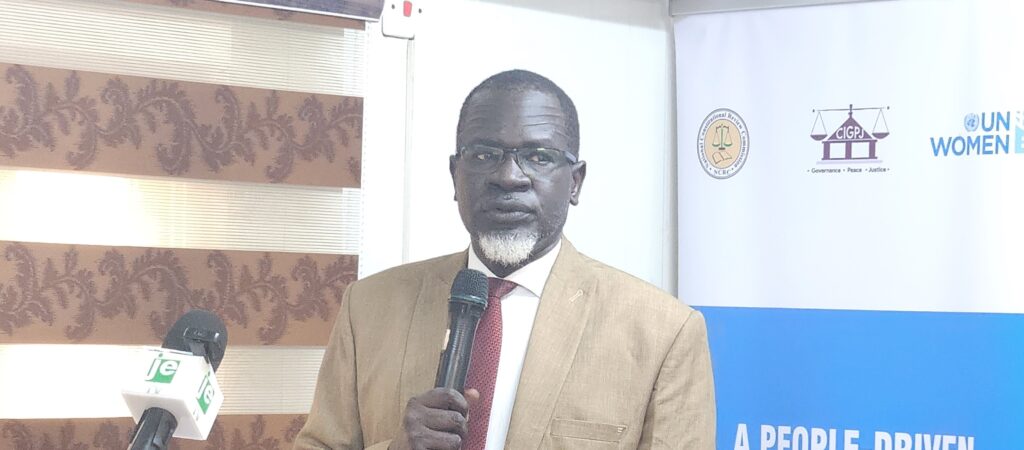The body tasked with drafting South Sudan’s permanent constitution is facing major delays due to a severe lack of government funding and worsening insecurity, its chairperson said Sunday, raising doubts about a key pillar of the country’s fragile peace process.
In an interview with Radio Tamazuj, Dr. Riang Yer Zuor, chairperson of the National Constitutional Review Commission (NCRC), said the government has not provided any of the budget it requested for the current financial year, forcing it to rely on international partners to conduct essential public consultations.
The commission is operating on an 18-month timeline aiming to produce a constitution before December 2026, a document seen as crucial for facilitating long-delayed national elections. While Dr. Riang said the deadline is still “doable,” the funding shortfall and spreading violence pose significant threats.
“Our work is moving on slowly, but with the support of the partners, basically,” Dr. Riang said.
The NCRC had planned to launch nationwide civic education and public consultations in March, but those plans were stalled.
Below are edited excerpts from the interview:
Q: How far has the work of the NCRC gone?
A: Thank you for the question. The NCRC has been working on a number of activities. We have divided our work into two categories. The first is procedural activities, which include administrative and capacity-building tasks. We are almost done with those.
The only activity left in that area is the recruitment and hiring of the members of the Constitutional Drafting Committee. But we put that off intentionally and deliberately due to a number of considerations. With that being the case, we feel we are ready to move into the second category of activities, which are the substantive constitution-making activities.
That was the reason we launched the civic education and public consultations campaign in March, so we could begin our nationwide campaigns. But then we also have the usual problem of funding. So, between March and now, we have not gone out to conduct nationwide exercises.
Recently, we reached an agreement with a number of partners, led by the U.N. Development Programme (UNDP) and others such as U.N. Women and the Center for Inclusive Governance, Peace and Justice, that we should begin our initial activities in the states. First, with four states: Eastern Equatoria, Lakes, Western Bahr el-Ghazal and Northern Bahr el-Ghazal. This is what we are about to do.
The workshop that has been going on for the last three days is basically an orientation workshop for the members before they depart for civic education and public consultations in those four states.
Q: We have seen a lot of political and security developments in the country since March, following the arrest of the First Vice-President. The cabinet has not been meeting, the budget has not been passed, and there has been a flare-up of violence in several parts of the country. Have these developments affected you, and if so, how?
A: We can’t say our delays are solely because of the current situation. Our activities should have begun long before the incident in March, but because of a lack of resources, we could not conduct them. At this point, we still have that issue of lack of funding.
There is no way we can say the funding is lacking because of the current situation, because it was a problem before the current situation happened.
Q: You had given yourself a timeline of 18 months to complete the process. Is that still viable? Are you going to make it in that 18-month period?
A: We do believe that it is doable. The members are prepared. They have the desire to do the work, and we think there are ways to compact our activities so we could carry them out in a shorter time. So, we still believe that we can complete the constitution-making process before December 2026.
Q: You talked of funding being one of the major hurdles. Can you elaborate? You mentioned a specific budget prepared for your activities. What percentage have you so far received from the government to complete the work within the given period?
A: The budget we submitted last year, before the last financial year, was not acted upon because it had not gotten the necessary approval from the parliament. When the last financial year’s budget was submitted, we resubmitted the same budget. At some point during that financial year, we had not received anything up to the point where the year ended.
We are now in a new financial year, and still we have not received anything yet.
Q: So, you are not receiving the necessary funding, which also means your work is at a standstill.
A: Correct. Our work is moving on slowly, but with the support of the partners, basically.
Q: Given the flare-up of insecurity in other parts of the country, especially in parts of Central Equatoria, is that not going to affect the work of the people who will be going on the ground? Are you worried it might affect their activities?
A: We are worried. It might definitely affect our activities if nothing is done at the political level by the parties to the agreement. When we go for civic education and public consultations, we go to the states, and that does not mean just the state capital. We also go to the counties. When insecurity is there in some counties, we will not be able to send our members to those insecure areas because the safety of our members is very important. So, definitely, if nothing is done, it will affect our activities.
Q: Finally, what is your message to the government?
A: Our message to the government has always been very clear: There must be a commitment to the constitution-making process. Commitment does not mean words. Actions are needed. First, resources must be made available to the commission. Second, the issues of security must be resolved so that our people, whom we send from here, go to places where they will feel secure.




